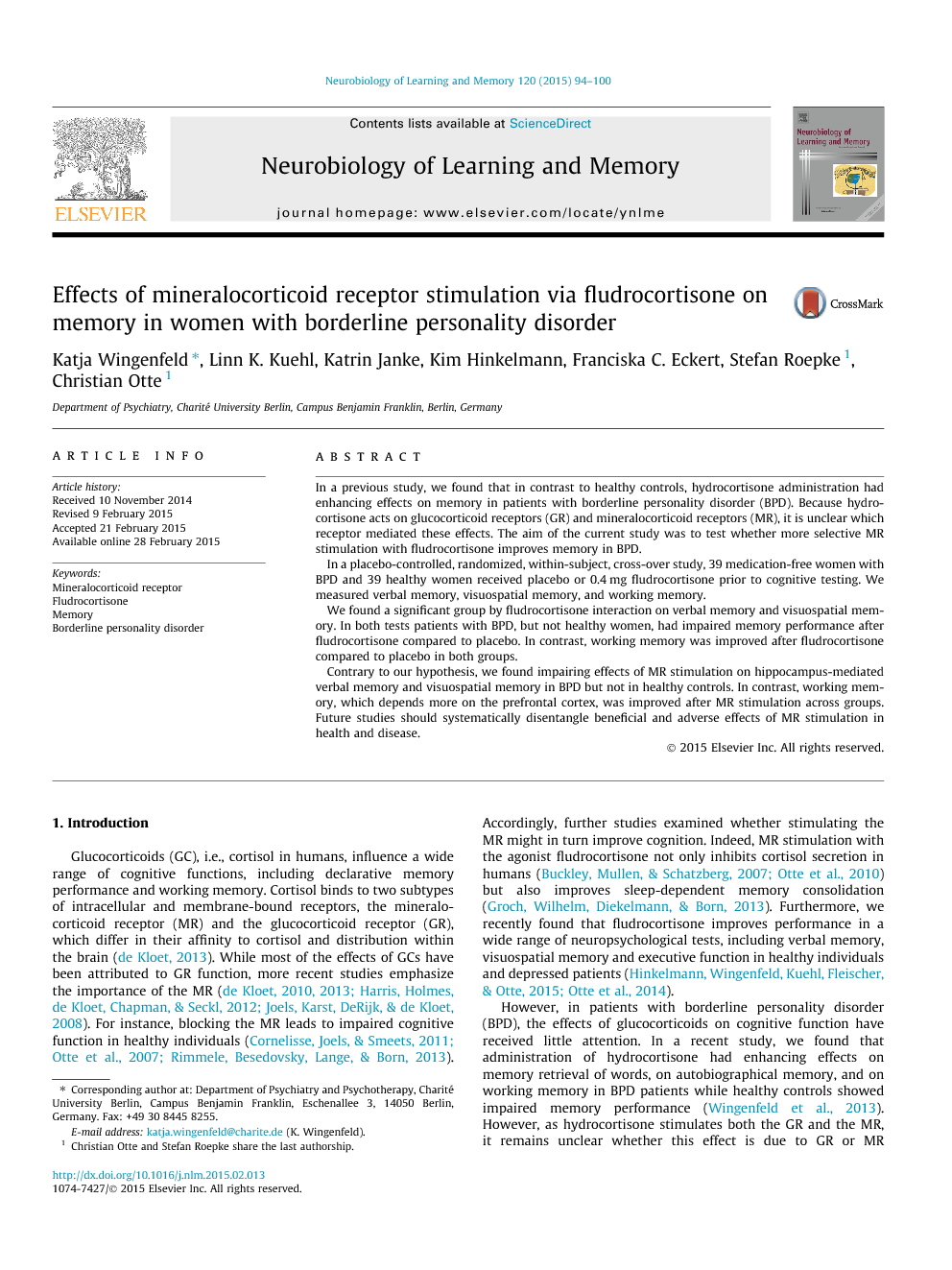In a previous study, we found that in contrast to healthy controls, hydrocortisone administration had enhancing effects on memory in patients with borderline personality disorder (BPD). Because hydrocortisone acts on glucocorticoid receptors (GR) and mineralocorticoid receptors (MR), it is unclear which receptor mediated these effects. The aim of the current study was to test whether more selective MR stimulation with fludrocortisone improves memory in BPD.
In a placebo-controlled, randomized, within-subject, cross-over study, 39 medication-free women with BPD and 39 healthy women received placebo or 0.4 mg fludrocortisone prior to cognitive testing. We measured verbal memory, visuospatial memory, and working memory.
We found a significant group by fludrocortisone interaction on verbal memory and visuospatial memory. In both tests patients with BPD, but not healthy women, had impaired memory performance after fludrocortisone compared to placebo. In contrast, working memory was improved after fludrocortisone compared to placebo in both groups.
Contrary to our hypothesis, we found impairing effects of MR stimulation on hippocampus-mediated verbal memory and visuospatial memory in BPD but not in healthy controls. In contrast, working memory, which depends more on the prefrontal cortex, was improved after MR stimulation across groups. Future studies should systematically disentangle beneficial and adverse effects of MR stimulation in health and disease.
Glucocorticoids (GC), i.e., cortisol in humans, influence a wide range of cognitive functions, including declarative memory performance and working memory. Cortisol binds to two subtypes of intracellular and membrane-bound receptors, the mineralocorticoid receptor (MR) and the glucocorticoid receptor (GR), which differ in their affinity to cortisol and distribution within the brain (de Kloet, 2013). While most of the effects of GCs have been attributed to GR function, more recent studies emphasize the importance of the MR (de Kloet, 2010, de Kloet, 2013, Harris et al., 2012 and Joels et al., 2008). For instance, blocking the MR leads to impaired cognitive function in healthy individuals (Cornelisse et al., 2011, Otte et al., 2007 and Rimmele et al., 2013). Accordingly, further studies examined whether stimulating the MR might in turn improve cognition. Indeed, MR stimulation with the agonist fludrocortisone not only inhibits cortisol secretion in humans (Buckley et al., 2007 and Otte et al., 2010) but also improves sleep-dependent memory consolidation (Groch, Wilhelm, Diekelmann, & Born, 2013). Furthermore, we recently found that fludrocortisone improves performance in a wide range of neuropsychological tests, including verbal memory, visuospatial memory and executive function in healthy individuals and depressed patients (Hineklmann et al., 2015 and Otte et al., 2015).
However, in patients with borderline personality disorder (BPD), the effects of glucocorticoids on cognitive function have received little attention. In a recent study, we found that administration of hydrocortisone had enhancing effects on memory retrieval of words, on autobiographical memory, and on working memory in BPD patients while healthy controls showed impaired memory performance (Wingenfeld et al., 2013). However, as hydrocortisone stimulates both the GR and the MR, it remains unclear whether this effect is due to GR or MR stimulation. Thus, it is possible that the positive effects of hydrocortisone on memory in BPD are also MR mediated.
In order to examine MR functioning in BPD, we administered fludrocortisone to stimulate the MR in patients with BPD and healthy controls and measured its effects on social cognition. Interestingly, we found higher scores on emotional empathy after fludrocortisone compared to placebo in healthy participants as well as patients with BPD, while there was no effect on cognitive empathy (Wingenfeld et al., 2014). These first results suggest unaltered MR functioning in BPD. Accordingly, a recent study of our group measured steroid sensitivity, i.e., ability of corticosteroids to inhibit T cell proliferation and did not find any differences between BPD patients and controls in MR and GR sensitivity (Fischer, Grundmann, Gold, Spitzer, & Wingenfeld, 2014). However, other studies suggest dysfunction of the GR in BPD by measuring gene methylation status (Martin-Blanco et al., 2014 and Steiger et al., 2013). Furthermore, studies that investigated the HPA axis function in BPD mostly revealed higher basal cortisol concentrations in concert with reduced feedback sensitivity, (Wingenfeld, Spitzer, Rullkotter, & Löwe, 2010), suggesting altered GR sensitivity. In line with the hypothesis of altered feedback sensitivity of the HPA axis in BPD, an exaggerated ACTH and cortisol response in the combined DEX/CRF test has been found, especially among those who reported childhood abuse (Rinne et al., 2002). In sum, there is evidence for altered GR functioning in BPD, while MR function seems intact. However, no study specifically addressed MR function and cognitive function in BPD.
Therefore, the aim of the current study was to further investigate the effects of MR stimulation by fludrocortisone on cognitive function in patients with BPD. We examined verbal memory, visuospatial memory, and working memory in 39 medication-free female patients with BPD and 39 age-, and education-matched healthy control women. Based on our results of enhanced social cognition after fludrocortisone in healthy controls and BPD patients (Wingenfeld et al., 2014) and our work suggesting improved cognition after fludrocortisone in healthy controls (Hinkelmann et al., 2015), we hypothesized that, across groups, fludrocortisone would improve memory function.


